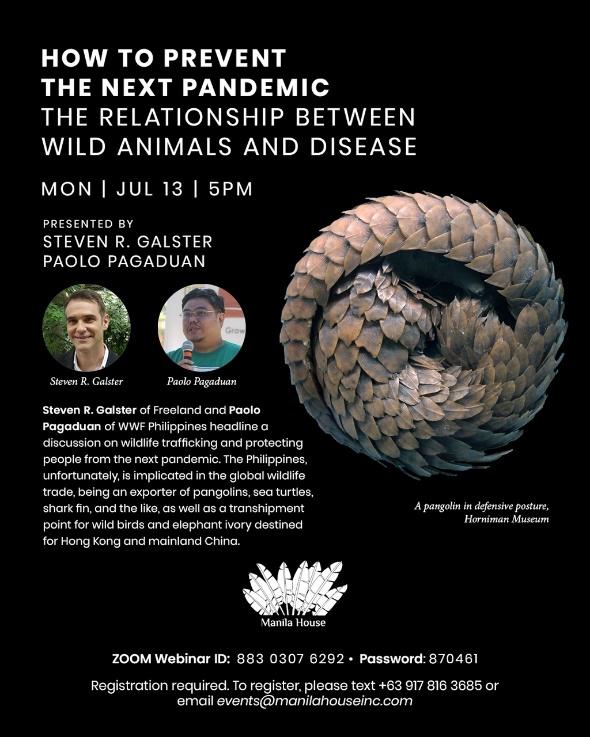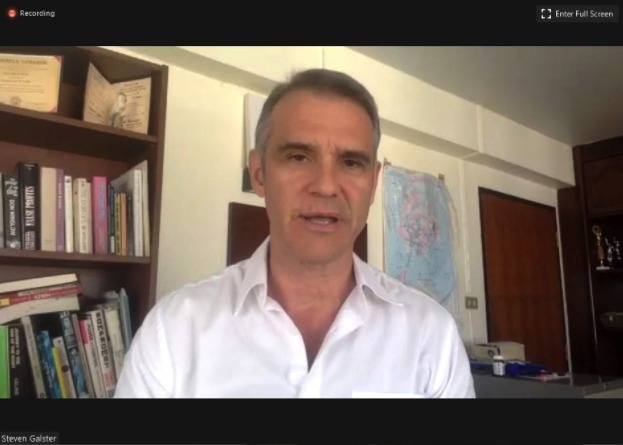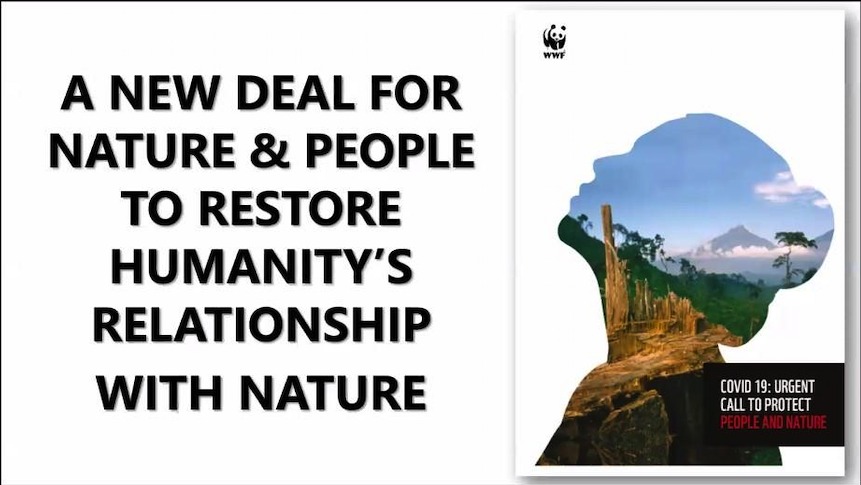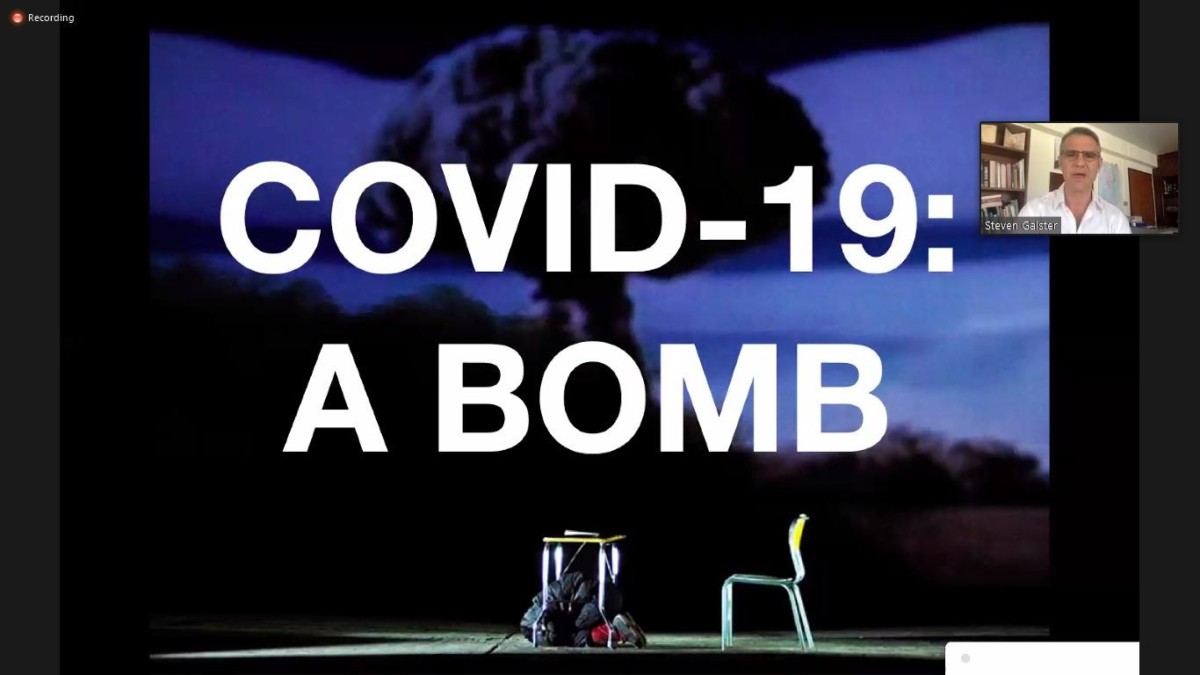Preventing the Next Pandemic Means Protecting Wildlife and the Health of the Environment
July 2020

WWF-Philippines Forests for Water Project Manager Paolo Pagaduan stresses the importance of reconstructing our relationship with nature and restoring natural habitats in order to keep future pandemics at bay. Photograph © WWF-Philippines
The Manila House organized an online Zoom webinar entitled, “How to Prevent the Next Pandemic – The Relationship Between Wild Animals and Disease,” held on the evening of the 13th of July, 2020, featuring key resource speakers working in the fields of conservation.
The event comes at the height of the COVID-19 pandemic, where sources of and solutions to the situation are being hotly debated.

Freeland Founder Steven Galster discusses the necessary measures to prevent the next pandemic. A renowned environmental and human rights investigator, Galster recognizes the role the illegal wildlife trade, and our relationship with nature, plays in causing pandemics. Photograph © WWF-Philippines
The Manila House webinar saw speakers from Freeland and the World Wide Fund for Nature (WWF) Philippines discuss the causes of the current pandemic and pathways to prevent the next one. The discussion revealed a clear conclusion – our relationship with nature is what causes these pandemics to occur in the first place, and that this must change to prevent future disasters.
Zoonotic transmission – the jumping of diseases and viruses from animals to humans – is the reason behind pandemics like COVID-19. "All it takes is one animal with a pathogen that we aren't prepared for, and bang, new disease,” said Freeland Founder Steven Galster. A renowned environmental and human rights investigator, Galster has spent over two decades combating the illegal wildlife trade. Galster recently launched a global campaign called “End Pandemics,” a multi-organizational effort designed to tackle the root causes of pandemics – including the illegal wildlife trade.
“What we're seeing is governments applying very expensive band-aids that constantly need changing,” added Galster, lamenting the dogged pursuit of a vaccine as the only solution out of the COVID-19 pandemic. While important, says Galster, we would have to look for another vaccine once again should the next pandemic break out. Effort, says Galster, should also be placed behind preventing the next big virus outbreak.

WWF-Philippines Forests for Water Project Manager Paolo Pagaduan stresses the importance of reconstructing our relationship with nature and restoring natural habitats in order to keep future pandemics at bay. Photograph © WWF-Philippines
Meanwhile, WWF-Philippines Forests for Water Project Manager Paolo Pagaduan presented WWF’s goal of restorative conservation as being an important part of protecting ecosystems and preventing the next pandemic. A natural scientist who has worked to restore habitats across the Philippines for over two decades, Pagaduan sees the role that protecting natural habitats plays in keeping the next pandemic at bay.
“We need to support activities that protect and restore natural habitats… And we also have to minimize our footprint, the way we consume the environment,” reminded Pagaduan, reiterating a point made by Galster that habitat loss increases the chances of new pandemics arising. As habitats disappear, explained Galster and Pagaduan, animals are forced to move closer to humans – exposing us to viruses that our immune systems are not prepared for.
Both Galster and Pagaduan proposed a number of measures to prevent the next pandemic. These measures include a ban on the commercial trade of wild animals; the establishment of a multi-agency task force to combat illegal wildlife trade; livelihood exit plans for those who deal with wildlife trade; crackdowns on regional cross border trade; along with efforts to reduce environmental degradation and restore damaged habitats. All these efforts, reminded Galster and Pagaduan, require strategy, political will and international cooperation for them to be effective.

Steven Galster likens the COVID-19 pandemic to a bomb, having gone off in one country but now affecting all. Photograph © WWF-Philippines
"We need to step back and change our relationship with nature... We need a strategy by which governments are protecting people, wildlife, and the environment at the same time," concluded Galster. While it is important that we pursue treatments, medications and solutions to the COVID-19 situation, only international behavioral change can keep the next pandemic from ever arising.
Caring for the health of the planet means caring for our health, too. Work with WWF-Philippines and other conservation organizations, and help us #ChangeTheEnding on this and all future pandemics.
For more information, please contact:
Mr. Paolo Pagaduan
Forests for Water Project Manager
ppagaduan@wwf.org.ph
For media arrangements, please contact:
Ms. Pam Luber
Integrated Communications Manager
pluber@wwf.org.ph
Ms. Chezka Guevarra
Public Relations, Media, and Events Assistant Manager
cguevarra@wwf.org.ph
